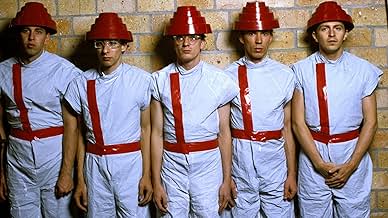En 1980, la banda de new wave Devo logró un éxito con "Whip It" y alcanzó reconocimiento popular con su mensaje de "des-evolución" social, formado en respuesta a los tiroteos de Kent State d... Leer todoEn 1980, la banda de new wave Devo logró un éxito con "Whip It" y alcanzó reconocimiento popular con su mensaje de "des-evolución" social, formado en respuesta a los tiroteos de Kent State de 1970.En 1980, la banda de new wave Devo logró un éxito con "Whip It" y alcanzó reconocimiento popular con su mensaje de "des-evolución" social, formado en respuesta a los tiroteos de Kent State de 1970.
- Premios
- 1 premio ganado y 1 nominación en total
- Self - Devo
- (as Jerry Casale)
- Self - Devo
- (as Bob Mothersbaugh)
- Self - Devo
- (material de archivo)
- (voz)
- Self - Devo
- (material de archivo)
- Self - Devo
- (material de archivo)
- (voz)
- Self - Devo's Manager
- (material de archivo)
- Self - 35th President of the United States
- (material de archivo)
- Self - 37th President of the United States
- (material de archivo)
- Self - 39th President of the United States
- (material de archivo)
- Self - 40th President of the United States
- (material de archivo)
- Self - Killed at Kent State Anti-War Protest
- (material de archivo)
- Self - Killed at Kent State Anti-War Protest
- (material de archivo)
- Self - Early Collaborator
- (material de archivo)
- (voz)
- Self - Christian Evangelist
- (material de archivo)
- Self - Singer-Songwriter
- (material de archivo)
- Self - Entrepreneur
- (material de archivo)
Opiniones destacadas
Yes, mindless consumerism and toxic capitalism is bad, but the same society they lampoon has awarded them a career. They know this (the doc nods to it in the second half) and while they're by no means the most shameless paradox in music (looking at you, Rage Against The Machine), you still can't help but cringe at the bigger picture unfolding in front of you with this film: privileged Me Generation ultimately changed nothing with their complaining and became the system they hated at varying degrees.
Especially when, during one particular archived interview, the members basically concede their pleasure in profiting from their fans and justifying it by audience numbers... the same logic used by their corporate and government peers.
Another flaw: the lack of insight to their core musicality. Mostly the film likes to cover social and thematic aspects of Devo, but almost no insight is offered about their actual music, the equipment, the historical place they have during post-punk and onward.
Devo's place in pop culture shouldn't be undercut but it also shouldn't be overstated. Ethos aside, in the greater story of music, they are still mostly that one-hit wonder band that made "Whip It". This doc tries to walk the middle-ground but can't totally get away with what it's trying to do, and frankly it's on the fringes of a puff piece.
The story is mostly told by leading band members Mark Mothersbaugh and Gerald Casale. A lot of stuff they talk about would be known to Devo fans, maybe some stories were new or defined better. They talk about their evolution from art students to bumbling musicians and how they came up with the raw Devo concept.
Right from the start Devo were very cynical and frustrated with the world, and stayed that way throughout their Devo journey. I'm not sure if they ever really thought they would alert the world and change it for the better. They take you through their clumsy early years as a band during the early to mid 1970's playing in small clubs and getting booed. Then in 1978 they gain a huge audience by playing on a TV show. A couple of years later Devo peaked with their hit song Whip it, and with some frustration they slowly faded away. Devo were innovative and excellent musicians tight and sharp, but the documentary doesn't give too much credit to this.
Once again, the documentary confirms that it is very difficult to put Devo into a musical genre, they just don't really fit anywhere. Once you see this documentary you might understand why. If you were/are a fan of Devo you should enjoy this. If you don't know or understand what Devo was all about, this might confuse you more!
As a teenager, I first heard Devo's music in 1978. I didn't know what I was listening to, but I liked it. I was drifting away from pop music and needed something else. Devo was a total different world of music. Tell people you liked Devo and most people would roll their eyes.
¿Sabías que…?
- TriviaDevo (via Mark Mothersbaugh) earns approximately $1 million annually from "Uncontrollable Urge," thanks to its long-standing role as the theme for MTV's "Ridiculousness."
- Citas
Mark Mothersbaugh: And after the set was over, Bowie came backstage, and he said he'd like to produce us. We're like, "Sounds good to us, because we're sleeping in an Econoline van tonight."
- ConexionesFeatures Island of Lost Souls (1932)
- Bandas sonoras(I Can't Get No) Satisfaction
Performed by Devo
Selecciones populares
Detalles
- Tiempo de ejecución
- 1h 34min(94 min)
- Color








































